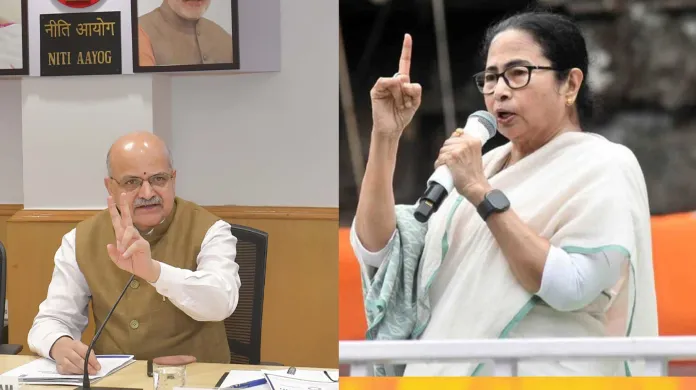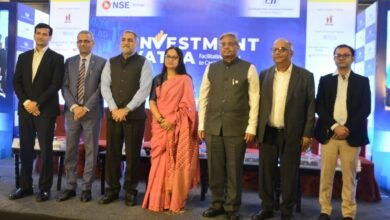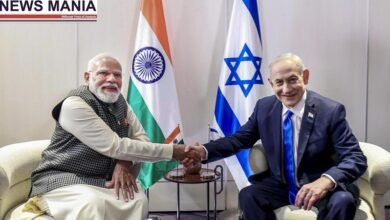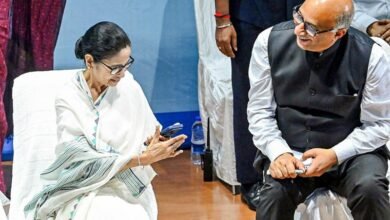NITI Aayog CEO Dismisses Mamata Banerjee’s Mic Muting Allegation at Meeting

News Mania Desk/Agnibeena Ghosh/28th July 2024
The Chief Executive Officer of NITI Aayog, B.V.R. Subrahmanyam, has refuted claims made by West Bengal Chief Minister Mamata Banerjee that her microphone was muted during her speech at a recent NITI Aayog meeting. Subrahmanyam clarified that each Chief Minister was allocated a specific speaking time, which was displayed on screens at their tables, and that Banerjee’s allotted time had simply expired.
In a press conference following the NITI Aayog meeting, Subrahmanyam explained that Banerjee had requested to speak before lunch, and this request was granted. “The Chief Minister of West Bengal requested to be given a turn before lunchtime. Normally, we would have gone alphabetically, starting with Andhra Pradesh, then Arunachal Pradesh. We adjusted, and the Defence Minister called her in just before Gujarat. So, she made her statement,” he stated.
Subrahmanyam elaborated that each Chief Minister was allotted seven minutes to speak, with a countdown timer visible on screens. When Banerjee’s time concluded, the clock showed zero, indicating the end of her speaking slot. “She said she would have liked to speak for more time but chose not to. We all heard her points respectfully, and they will be reflected in the minutes. The Chief Secretary continued to attend the meeting even after she left to catch a flight to Calcutta,” he added.
Union Finance Minister Nirmala Sitharaman also rejected Banerjee’s claim, stating that every Chief Minister was given their allotted time to speak. “CM Mamata Banerjee attended the NITI Aayog meeting. We all heard her. Every CM was given their allotted time, displayed on the screen before each table. It’s completely false that her mic was turned off. Every CM was given their due time to speak,” she told ANI.
The CEO further noted that the Chief Ministers of ten states and Union Territories did not attend the meeting, listing absentees including Kerala, Tamil Nadu, Karnataka, Telangana, Bihar, Delhi, Punjab, Himachal Pradesh, Jharkhand, and Puducherry. “We had 10 absentees and 26 participants. The Chief Minister of West Bengal was present,” he said.
Sitharaman described Banerjee’s claims as “unfortunate,” adding that the government was pleased that the West Bengal Chief Minister attended the meeting and presented her points. “It’s unfortunate that the Chief Minister of West Bengal, Mamata Banerjee, has claimed that her mic was switched off, which is not true. We’re happy she participated in this meeting, presented her case for West Bengal, and spoke for the opposition. But even as she did so, we adhered to the procedure,” Sitharaman remarked.
She suggested that Banerjee should have requested more time if needed, instead of using the situation as an excuse to walk out. “If reminded that her time is over, she could have requested to continue speaking like other Chief Ministers did. Instead, she used it as an excuse to leave the meeting,” Sitharaman said. “She should speak the truth rather than build a narrative based on falsehood,” she added.
Earlier, the central government’s fact-checking body, PIB, refuted Banerjee’s claims, stating that “only the clock showed that her speaking time was over.” A PIB fact-check today debunked her allegations, asserting that Banerjee’s turn to speak was accommodated before lunch on an official request from the West Bengal government.
Speaking to reporters, Banerjee alleged “political discrimination,” claiming she was not allowed to speak for more than five minutes while other Chief Ministers were given more time. “I said the central government should not discriminate against state governments. I wanted to speak, but my mic was muted. I was allowed to speak only for five minutes. People before me spoke for 10-20 minutes,” she said after leaving the meeting.
Banerjee stated that she participated in the meeting to strengthen “cooperative federalism” and share regional aspirations, criticizing the central government for what she perceived as unfair treatment. “If a state is strong, the Union will be strong,” she concluded, emphasizing the need for fair representation and support for states like West Bengal.






